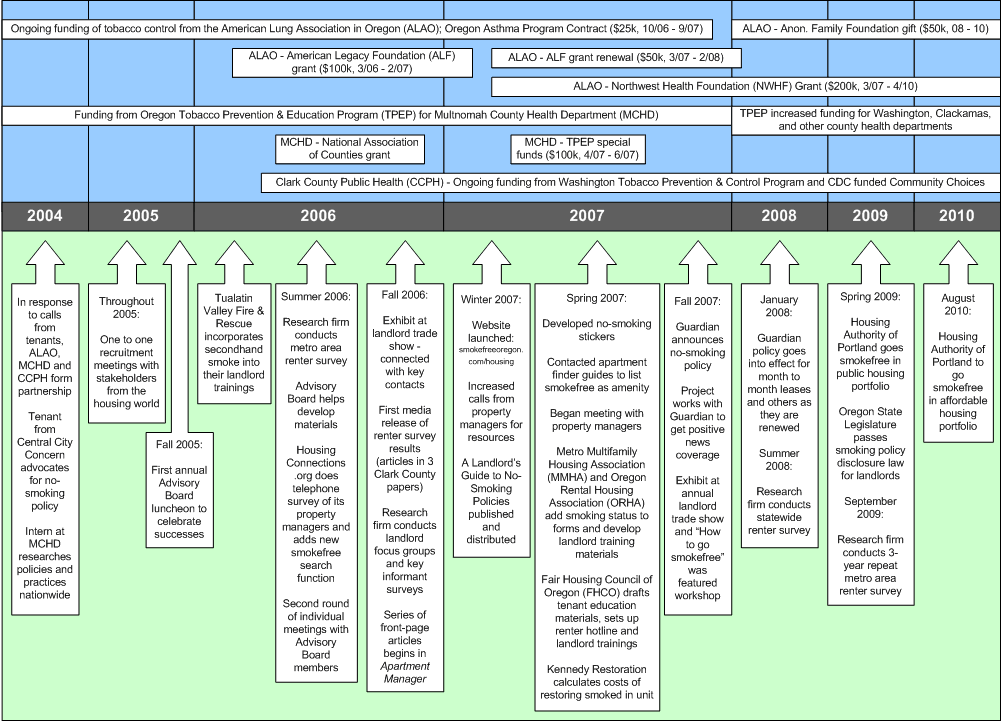Moving Multiunit Housing Providers Toward Adoption of Smoke-Free Policies

Figure 1. Timeline and funding streams for the Portland-Vancouver
Metro Area Smokefree Housing Project. Abbreviation: Anon., Anonymous
This figure provides a timeline of key events and receipt of funds for
the Portland-Vancouver Metro Area Smokefree Housing Project. The time
covered is from the project’s inception in 2004 through 2010.
Beginning in 2004, the project received funding of tobacco control from
the American Lung Association in Oregon (ALAO); funding of $25,000 from
October 2006 through September 2007 was through Oregon Asthma Program
Contract. Also beginning in 2004, funding came from the Oregon Tobacco
Prevention and Education Program (TPEP) for Multnomah County Health
Department (MCHD). In 2008, that funding was increased for Washington,
Clackamas, and other county health departments.
From March 2006 through February 2007, the project received a $100,000
grant from an American Legacy Foundation (through ALAO); that grant was
renewed for March 2007 through February 2008 for $50,000.
Beginning in 2006 and continuing through 2010, Clark County Public Health
(CCPH) in Vancouver, Washington, provided ongoing funding from the
Washington Tobacco Prevention and Control Program and CDC-funded Community
Choices.
In 2006, MCHD received a grant from the National Association of Counties.
From March 2007 through April 2010, the project received a $200,000 grant
from the Northwest Health Foundation (through ALAO).
In April through June 2007, MCHD received $100,000 in special funds from
TPEP.
From 2008 through 2010, ALAO received an Anonymous Family Foundation gift
of $50,000.
Key events on the project timeline were the following:
2004
- In response to calls from tenants, ALAO, MCHD, and CCPH form a
partnership.
- A tenant from Central City Concern advocates for a no-smoking
policy.
- An intern at MCHD researches policies and practices
nationwide.
2005
- One-to-one recruitment meetings with stakeholders from the housing
world are held throughout 2005.
- In the fall of 2005, the first annual advisory board luncheon is
held to celebrate successes.
2006
- Tualatin Valley Fire and Rescue incorporates secondhand smoke issues
into their landlord trainings.
- In the summer, a research firm conducts a metro area renter survey,
the advisory board helps develop materials, HousingConnections.org does a telephone survey of its property managers
and adds a new smoke-free search function, and a second round of
individual meetings with advisory board members occurs.
- In the fall, an exhibit at a landlord trade show provides
connections with key contacts, the first media release of renter survey
results (articles in 3 Clark County papers) occurs, a research firm
conducts landlord focus groups and key informant surveys, and a series
of front-page articles begins in Apartment Manager.
2007
- In the winter, smokefreehousinginfo.com website is launched,
there are increased calls from property managers for resources, and A
Landlord’s Guide to No-Smoking Policies is published and distributed.
- In the spring, the project developed no-smoking stickers, contacted
apartment finder guides to list smoke-free as an amenity, began meeting
with property managers, the Metro Multifamily Housing Association (MMHA)
and Oregon Rental Housing Association (ORHA) add smoking status to forms
and develop landlord training materials, the Fair Housing Council of
Oregon (FHCO) drafts tenant education materials and sets up renter
hotline and landlord trainings, and Kennedy Restoration calculates the
costs of restoring a smoked-in unit.
- In the fall, Guardian announces its no-smoking policy, the project
works with Guardian to get positive news coverage, and an exhibit at an
annual landlord trade show and “How to Go Smokefree” was a featured
workshop.
2008
- In January, the Guardian policy goes into effect for month-to-month
leases and others as they are renewed.
- In the summer, a research firm conducts a statewide renter survey.
2009
- In the spring, the Housing Authority of Portland goes smoke-free in
its public housing portfolio, and the Oregon State Legislature passes
smoking policy disclosure law for landlords.
- In September, a research firm conducts 3-year repeat metro area
renter survey.
2010
- In August, the Housing Authority of Portland is to go smoke-free in
its affordable housing portfolio.
|
